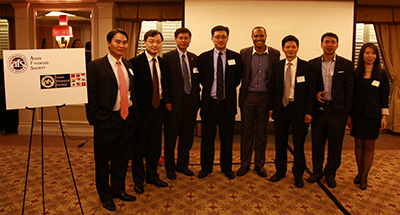U.S. and China: Economic Development and Capital Markets
High-profile business, academic, and civic leaders from both countries met for a “think tank” discussion and networking at the Cornell Club in New York City.

By Morgan Jones, MBA ’15
On Monday, September 30, 2013, I was invited as a guest speaker and participant to a panel discussion on US-China Economic Development and Capital Markets at the Cornell Club of New York City. The event was coordinated by the Asian Financial Society (AFS, of which I am a member) and the Tsinghua University School of Economics and Management (SEM, one of the top schools in China) in partnership with the Johnson Graduate School of Management at Cornell University. I was joined at the event by 110 of my MBA classmates in the Cornell MBA for Executives program, along with a number of AFS members and students from the Tsinghua SEM.

The evening began with a cocktail hour, where I met and shared business cards with dozens of executive-level students, some of whom had just arrived in New York City from Beijing. Although jet lagged, they were very excited to spend some time at the Cornell Club connecting with their Cornell University counterparts.
Following the networking time, I opened the event by presenting a congratulatory letter from our Associate Dean of Executive Education, Professor Elizabeth Mannix. The letter was directed to Professor Jinliang Li, Associate Dean of Tsinghua SEM and one of the featured panelists of the evening. Professor Mannix wrote, “There are over 250 Johnson alumni in China, several of our faculty have on-going research projects in China, and we continue to expand our effort in the country.” While I read the letter in English, I continued my comments in Mandarin—a language I mastered during six years of study and work in China. It was an honor to welcome the executive students and faculty members from China on behalf of the AFS, Cornell University, and the New York City Office of the Mayor, where I worked at the Mayor’s Community Affairs Unit (CAU) and Housing Recovery Operations (HRO) covering the borough of Queens.
Blake Zhang, chair of the Asia Finance Society, kicked off the meeting by talking about AFS’ partnership with Cornell University, especially since Sam Van MBA ’13, connected the two a couple years back. Blake remarked on how he enjoys connecting successful business leaders to Cornell’s MBA program for executives and the Asian Financial Society. AFS recently opened an office in Shanghai, China, my home for three years and my wife’s native city.
The evening proceeded with three presentations on economic development and capital markets, beginning with Mr. Haoliang Xu, Assistant Secretary General, of the United Nations Development Programme. In his presentation, “Partnership for Development- What can Business Do?” Mr. Xu spoke about the importance of partnership between the United Nations, local governments, and private enterprises. These partnerships play a major role in his organization, as it faces global challenges, such as educating the public about AIDS, fighting hunger, and helping redevelop war- torn countries. As a member of New York City government, his speech made a big impact on me. I know from experience that without public-private partnerships, it would be difficult for my office to supply food for the thousands of victims of Hurricane Sandy living without heat, hot water, and electricity after the storm.
Prof. Jinliang Li, Associate Dean, Tsinghua School of Economics and Management (SEM), gave a presentation titled “Building a New City in No Time: Puzzle or Promise?” in which he gave an in-depth look at real estate in China. Many Americans are aware of the large, fully built, yet unoccupied neighborhoods that stand just outside of China’s largest cities. While there are concerns of housing bubble and a dearth of home purchases, due to China’s fast-rising housing prices, these neighborhoods could accommodate millions and create entirely new cities. Prof. Li gave examples of the costs behind these major developments in various areas of China, from Chongqing to Shanghai.
“Cross-border Funding for Chinese Investors” was the topic of a presentation by Mr. Mingqiang Bi, President and CEO at ICBC US. Mr. Bi’s points hit home for me, as he and I both agree that the playing field for international investments has shifted from investment into China to investment from China into the United States. Mr. Bi spoke about barriers and obstacles Chinese must understand, when entering foreign markets.
Lastly, Mr. Yong Ma, Managing Director of Firm Risk at Morgan Stanley spoke about “Risk Management after the Financial Crisis”. Yong Ma gave a riveting speech in both Chinese and English about what occurred in fall of 2008 and the ongoing aftershocks of the stock market crash, still felt today.
Following the presentations, participants enjoyed a question-and-answer session and more networking among all attendees. It was an evening filled with cross-cultural engagement, understanding and discussion about one of the most fascinating countries of the business world, China.
Morgan Jones is a student in the Cornell MBA Program for Executives, and Senior Advisor for the Mayor’s Office of Housing Recovery Operations, Queens.
